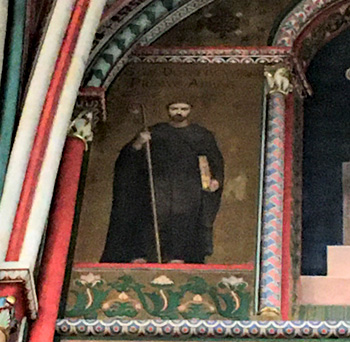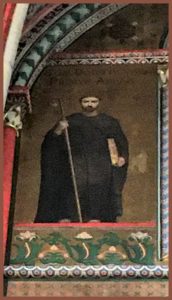
St. Droctoveus of Saint Germanus (c. 576-580)
Feast Day: March 10/23
Droctoveus (Latin: Droctonius), who is also known under the abbreviated name of Drotté, was born in the region of Auxerre. From his youth he was confided to the hegumen Germanus, then the superior of the monastery of Saint Symphorian of Autun, in Burgundy. It was he who formed him by teaching him the virtues practiced by the anchorites of the East. But this was above all by imitating Germanus himself that Droctoveus rose himself to an eminent degree in the monastic virtues. When Germanus became bishop of Paris, he attracted near him his disciple Droctoveus. At the death of Childebert, in A.D. 558, the bishop celebrated the dedication of the church which this king had built in order to preserve in it the diaconal orarion of the martyr Saint Vincent, brought from Spain. In order to serve this church, Germanus placed in it monks, whose direction he confided to Droctoveus: such were the beginnings of the abbey of Saint Vincent, later known as Saint-Germanus-in-the-Meadows (after the repose of its founder, Saint Germanus). The Latin poet Fortunatus made the eulogy of the new hegumen, of whom he was a contemporary as Archbishop of Poitiers. By his examples, more than by his lessons, Droctoveus established in the new monastery the spirit of mortification, retreat and renunciation of the world. He himself was extremely humble, austere, chaste, fervent in prayer, zealous for discipline, charitable toward the poor, prudent and patient. These qualities shone in him during the twenty years that he governed the community. He contributed thusly to ensure the renown of this famous abbey, whose monks adopted later the rule of Saint Benedict. Droctoveus died around A.D. 580.
Troparion
6th tone (Plagal 2nd)
The Church celebrates today thy memory, O Droctoveus, giving thanks to thee for the virtues which in Burgundy thou didst practice in imitation of the monks of the East and which thou didst make to flower in the abbey of the Parisians, where thou wast a teacher leading thy disciples to Christ our God.
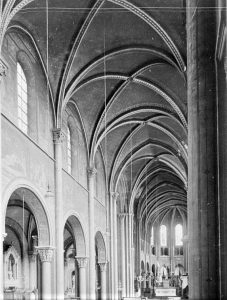
(public domain)
Kontakion
6th tone (Plagal 2nd)
Humility, O Saint Droctoveus, permitted thee to ascend to heaven, and thou didst become rich in virtues, thou who had the spirit of poverty; obedience has made thee capable of directing other monks, in thy turn; and, renouncing the world, thou hast conquered it for the glory of Christ our King.
Verses from the canon, Ode 8:
Using the same criteria for all the ascetics having lived in monasteries which later were placed under the rule of Saint Benedict, Benedictine monks considered Droctoveus as one of their own.
Bless the Lord, Father Son and Holy Spirit.
Restore in the hearts of thy children, O Father Droctoveus, the fervor of the first times and grant that we still live in our days the ideal kindled in thee by the love of Christ.
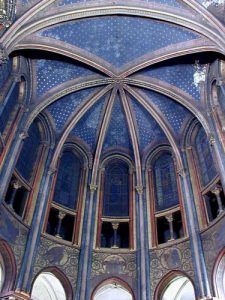
Photo by rucativava on Flickr.jpg
Both now and ever and unto the ages of ages. Amen.
O all-undefiled Theotokos, chosen among women, we call thee blessed, opulent mountain from which stone Christ was extracted, who has broken the steles which men have carved, He the supremely exalted God.
And from Ode 9:
Forget not, in thy presence before Christ, O holy Father Droctoveus, them that showed thee by their hymn that they have not forgotten thee, but keep, after so many centuries, thy memory.
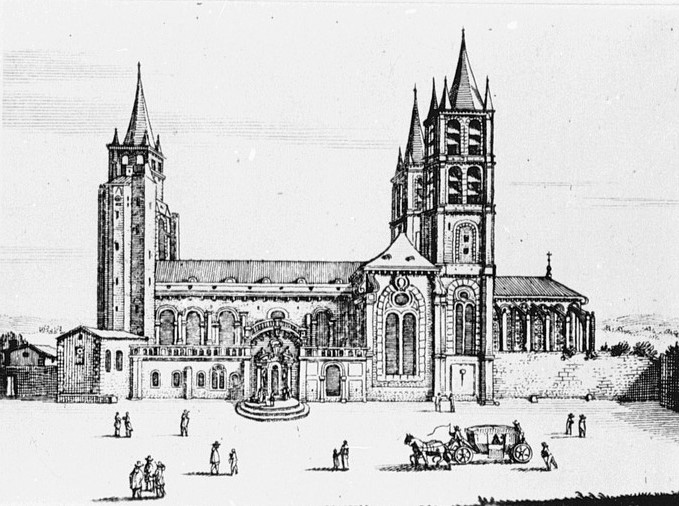
Translated by Schema-Archimandrite John (Lewis) +2007
From the French Akolouthia composed in 2001 by Hieromonk Denis (Guillaume) +2008, in Supplément au Ménée de MARS and published in Самиздат, September 2001, pages 120-125
Synaxaria augmented by Mother Andrea

